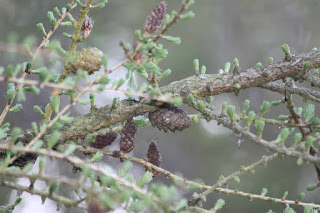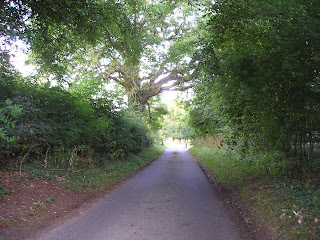My Favourite Tree
When I was a small child I was lucky enough to be sent to a
school that had once been a large country house. Its gardens had long been allowed to return
to the wild and it was difficult to differentiate between them and the meadows
that came with the property. Lessons on
warm summer days were often taken outdoors sitting not on chairs but on a bank of
short mown grass. This sounds – and was,
of course – idyllic but rules were strict and we had to sit in rows as straight
as the chairs in the classroom. At playtime
we could run about through the longer grass chasing butterflies and trying to
catch grasshoppers in our school caps.
Even in those early days I hated being indoors during bad
weather and found it hard to concentrate on lessons in the classroom for there
always seemed to be something more interesting happening outside. Our teacher must have felt the same for with
the first sign of sunshine we would be back once more in the open air. It is said that every child remembers the
name of their first teacher and mine, Miss Vine, I recall with great affection
and gratitude for it was she that first took me on a nature walk. The walk – the earliest of all my schoolday
memories – triggered off a lifelong love of and fascination with nature.
We were led one late winter’s day wrapped up in our gaberdine
raincoats, belts tightly buckled at the waist, crocodile fashion in pairs
through the meadows further than we had been before. How exciting to be exploring somewhere new! When we came to an old wooden gate we passed
through onto a wide, open path lined with trees, their trunks as straight as
soldiers and towering high above us. The
path instead of being muddy was soft and springy, our feet cushioned by years
of fallen needles. Miss Vine had brought
us to a larch wood; an inspired introduction to trees for everything about them
is childlike in scale apart from their height which she said led to a magic
world way, way above.
We never were told how we might reach the magic world but
she pointed out the gifts that were dropped from it so that we might learn all
about the birds and animals that lived there.
She picked up a fallen piece of branch with its tiny cones attached,
perfect child-sized miniatures of the larger Spruce fircones, and gave it to us
to look at and then we all found our own and carried our ‘gift’ back to the
classroom to draw it in painting class.
As the months went by we visited the trees often, watching
how the hard, knobbly, dead-looking branches opened into soft tufts of the
brightest green. We marvelled at how the
cones formed starting off green and pink before turning chestnut and then
brown. And in the autumn we watched as
the needles – and it puzzled us that needles could be soft – turned glorious
shades of yellow and orange before falling to the ground.
During those visits we learnt about different types of trees,
about the wild flowers and birds, the animals and other wildlife. It was only many years later that I realised
that Miss Vine had taught us that there really was a magic world – the one that
we live in and take for granted every day of our lives.





What a wonderful teacher, and what a gift to pass on to you. I can remember the first time I saw fly agaric (when I was 6, on my first nature walk with school) and it triggered off a lifetime's fascination with toadstools & fungi.
ReplyDeleteMiss Vine...now there is a beautiful name. Your post was lovely to read Johnson. Thank you for sharing it.
ReplyDeleteIn the autumn, where I live, the highways are lined with larch, which look so radiant turning to brilliant gold as they lose their needles. It is the preferred wood for building wharfs here as well.
Thanks for the comments - interesting Gretel that your first nature walk made such an impression too. Pleased to read that you are settling into your new home - it looks great.
ReplyDeleteBren - hadn't thought about wharf building - it took me years to realise that the outdoor cladding that we use on buildings called larchlap was called that because it is made from larch!
Johnson
I'm a little envious. Nature walks were not part of my schooling. I had to wait until I was a botany/zoology student for that. Are children still taken on nature walks at school?
ReplyDeleteWhat a great teacher Miss Vine was. Thanks for sharing that memory with us all.
ReplyDeleteDiana, I was very lucky of course going to a very small school in a very lovely location -although it was obliterated by the building of the M40 motorway some years ago. I don't suppose children do go on nature walks anymore - probably against health and safety regulations!
ReplyDeleteDoc - you're right - Miss Vine was terrific. She also taught us all about the Iron Age by getting us to build a model village out of matchsticks.
Johnson
This comment has been removed by the author.
ReplyDeleteDavid - many thanks for your kind words and I'm delighted you are enjoying my blog.
ReplyDeleteI do hope you will come here many times and also visit my Facebook page which has very frequent updates about the secret valley.
Johnson
I love the description of the trees and that walk through the pine needles. I felt that under my feet and that special smell, sharp pine and musky mossy loam. You know how I feel about the hedgerows and their inhabitants so I will look forward to a progression of pictures showing how they change through the year.
ReplyDeleteJanice
Our interests in wildlife and places are very similar, Janice, aren't they? I've noticed that with your writing too. Perhaps it is because we were both brought up in the Chilterns and in the same era - you just settled a bit further afield than I did!
ReplyDeleteHappy New Year!
Johnson